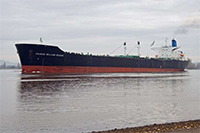BP’s SCHEME TO DUMP TOXIC SHIP ON SOUTH ASIAN SCRAPPING BEACH UNDER SCRUTINY BY U.S. OFFICIALS
BAN Media Release
 |
 |
 |
 |
| |
 |
|
| |
Prince William Sound
Photo by Phil Gilston as published in Shipspotting.com |
|
 |
 |
 |
| |
 |
|
| |
Shipbreaking Yard, Alang, India, processing asbestos from scrapped ship.
©2010 Greenpeace |
|
 |
 |
 |
|
| |
28 October 2010 (Seattle, USA.) – According to the toxic watchdog organization Basel Action Network (BAN), a U.S. flagged oil tanker named "Prince William Sound”, that is part owned by BP and formerly was used to haul BP oil, is about to be sold for scrapping on the notorious shipbreaking beaches in South Asia. The ship, built in 1975 and whose namesake and owner are all too familiar reminders of recent environmental disasters, is likely to contain toxic wastes such as asbestos, polychlorinated biphenyls (PCBs) and other hazardous substances, and as such poses a threat to workers and the environment should it be exported to a developing country.
The vessel is reportedly moored now in a BP shipping depot in Malaysia, and its transfer is imminent. If the U.S. government fails to quickly intervene, the ship could be run up on the beaches of India, Bangladesh or Pakistan within days, where impoverished laborers break down ships by hand, subjecting them to explosions, accidents and occupational disease from exposure to toxic substances. This “beaching” method of scrapping ships is also devastating to local environments due to pollution and mangrove forest destruction undertaken to make room for the ships.
According to officials at the United States Maritime Administration (MARAD), the sale must first be approved by them based in part by a determination by the U.S. Environmental Protection Agency (EPA) that the export will not violate the Toxic Substances Control Act (TSCA) or other environmental laws. They have been notified by the ship’s owners (it is 25% owned by BP) of their intent to sell the vessel for scrap to a cash-buyer, a middleman who allows companies like BP to both sidestep controversy and avoid direct sales to Asian shipbreaking yards and also make a large profit by avoiding responsible and more expensive ship recycling in the U.S. or another developed country.
“BP is proving once again a callous disregard for people and the environment,” said BAN’s Green Ship Recycling Campaign Director, Colby Self. “The EPA and MARAD must step in now and prevent what could be another BP-sponsored environmental disaster.”
Unlike BP, Chevron opted this year to recycle two of its tankers in Brownsville, Texas, in accordance with strict U.S. environmental and labor protection laws. Chevron’s environmentally responsible ship disposal decisions in 2010 generated U.S. green recycling jobs at a time when U.S. jobs are much needed.
Due to the year of construction, the “Prince” likely contains PCBs, asbestos of other hazardous materials within its construction. The EPA has noted, “Although no longer commercially produced in the United States, PCBs are most likely to be present in vessels deployed before the 1979 PCB ban.(1)” The Toxic Substances Control Act (TSCA), in force since 1979, prohibits the export of PCB contaminated material for disposal purposes. However, the U.S. EPA has long struggled to enforce TSCA against shipping industry violators, particularly when vessels operate outside U.S. waters and beyond EPA jurisdiction.
MARAD is required by law to authorize the foreign scrapping and reflagging to foreign registry of all U.S. flagged vessels; but in past years, BAN’s protests have revealed that MARAD’s review neglected to consider the potential violation of laws that were enforceable by agencies outside MARAD’s jurisdiction. As a result, many U.S. vessels were reflagged and sold or scrapped abroad in violation of TSCA. Now, MARAD and EPA have established a new process of review in which MARAD seeks EPA judgment to ensure compliance with TSCA prior to any reflagging or foreign scrapping authorization.
“The new Maritime Administration should be applauded for promising to more carefully monitor ship sales to prevent violations of U.S. environmental laws,” said Mr. Self. “But this is the test case. It’s time to take a stand and uphold environmental and labor protection laws for everyone everywhere. We urge MARAD and EPA to halt this sale as a matter of urgency.”
For more information, contact:
Mr. Colby Self
Green Ship Recycling Campaign Director
Basel Action Network
+001 206 250 5652
(1) National Guidance: Best Management Practices for Preparing Vessels Intended to Create Artificial Reefs, http://www.epa.gov/owow/oceans/habitat/artificialreefs/documents/pcb.pdf
FAIR USE NOTICE. This document contains copyrighted material whose use has not been specifically authorized by the copyright owner. The Basel Action Network is making this article available in our efforts to advance understanding of ecological sustainability and environmental justice issues. We believe that this constitutes a 'fair use' of the copyrighted material as provided for in section 107 of the US Copyright Law. If you wish to use this copyrighted material for purposes of your own that go beyond 'fair use', you must obtain permission from the copyright owner.
More News
|